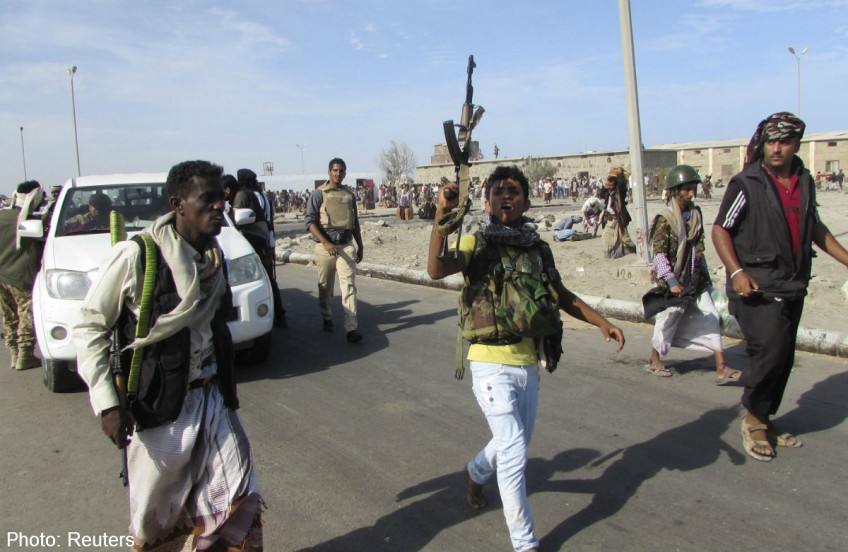In Yemen, stricken Aden resists Houthi fighters' advance

ADEN/DUBAI - Plunged into darkness, low on water and short of food, Samah Mulhi and her family huddle in their home in the Yemeni city of Aden as explosions and gunfire reverberate outside.
The southern port is under siege by the Houthis, an Iran-allied militia undeterred by 13 days of Saudi-led air strikes meant to blunt their southward push from the capital Sanaa, which they hold.
Saudi Arabia says defending the "Aden government" is their operation's main objective, but two weeks into street battles between armed residents and the Houthis backed up by army units, the city at the crux of Yemen's future now fights for its life with no government, no president and no army.
In their absence, the defence of the city is often a do-it-yourself affair, with residents looting whatever weaponry the turmoil of war makes available. "Average people - doctors, teachers and workers - took the weapons to defend themselves," said Mohammed al-Makawi, a local activist. "They don't have fighting experience and are facing all kinds of rockets and artillery. They managed to take hold of a few tanks but don't really have the technical knowledge to use them," he added.
Yemeni President Abd-Rabbu Mansour Hadi fled to Aden from the Houthi-controlled capital Sanaa last month, but moved on to the Saudi capital Riyadh as Houthi forces fighting with troops loyal to powerful former president Ali Abdullah Saleh closed in on the city.
CITIZEN SOLDIERS
Hadi rallied to his side armed tribesmen from his home district near Aden, and when Houthi forces began a lightning advance on March 22, the president's loyalists attacked army bases in and around the city.
Residents say the soldiers in those bases - almost all northerners and Saleh loyalists - quit their posts and left behind weapons that were grabbed by the southerners, who organised themselves into militias dubbed "popular committees".
While military expertise is lacking, there is no shortage of fighting spirit. "They will not control our city. The resistance and the free sons of Aden are strong and will repel them," Mulhi, a civil society activist, told Reuters by telephone from her house in the stricken district of Khor Maksar. "The Houthi snipers outside will shoot anything that moves ... But can you imagine that we, or those who have had shells fired into their family homes, will accept the invasion?" she said.
When Hadi fled abroad, his armed tribesmen melted away to battle the Houthis closer to home, leaving Aden's defenders to say that they no longer fight for the president, but for their homeland. "We're defending our beautiful city Aden from this unjustified Houthi-Saleh invasion," said a young fighter manning the front in one Aden neighbourhood. "We don't know why they came here or what they want, but we youth will fight for our city, even if we can't match their heavy armour," said the man, a factory worker before the fighting started.
The militiamen have desperately called for an Arab ground invasion to save the city. None has arrived, although Saudi Arabia has parachuted in weapons and equipment.
NORTH VS. SOUTH
The conflict has exacerbated decades of tensions between northern Yemen and the formerly independent socialist South that may long outlast the fighting.
An armed Islamist group from Yemen's northern highlands, the Houthis have made common cause with Saleh, a northerner who crushed an attempt at armed secession by the South in a 1994 war which, like today, saw his forces advancing into Aden.
A southerner from near Aden, Hadi was Saleh's defence minister and was loathed by many Southerners and Adenis for two decades. Hadi rose to the presidency when Saleh agreed to step down after Arab Spring protests in 2011. Hadi's elevation raised the South's prestige and gained him more sympathy there.
The Houthis, a Shi'ite Muslim militia, say they are fighting a revolutionary war against corrupt officials and claim their advance is ridding the country of Sunni Al Qaeda militants.
But their reasoning is falling on deaf ears in the South, where the fighting is largely seen as another northern affront. "In 1994 they said we were socialists with no religion, and now they say we're terrorists and al-Qaeda, Islamic State and all that," said Adeni writer and journalist Mohammed Fadhl. "The story is the same: they want Aden because it's strategic and sits on the Arabian Sea, and they want the South because it has the oil resources," he added.
As southern militiamen battle the Houthis and Saleh loyalists across hundreds of miles of mountains, deserts and coastline, advocates of secession may be sensing their chance to break away has come. "There's coordination among the resistance from Aden, Dhalea, Shabwa and other fronts," separatist activist Omar al-Jawi told Reuters. "All the factions of the South are united by this attack, and the South will be able to decide afterwards what they want for their own future."